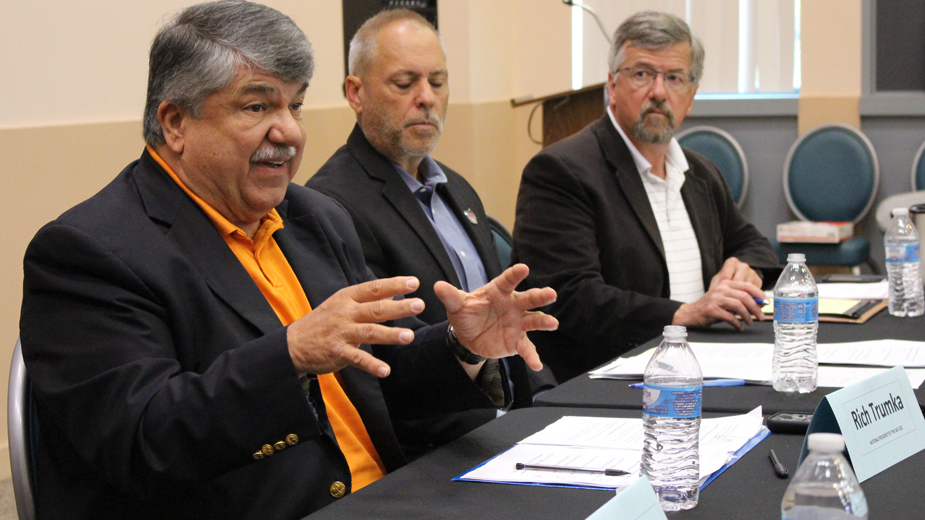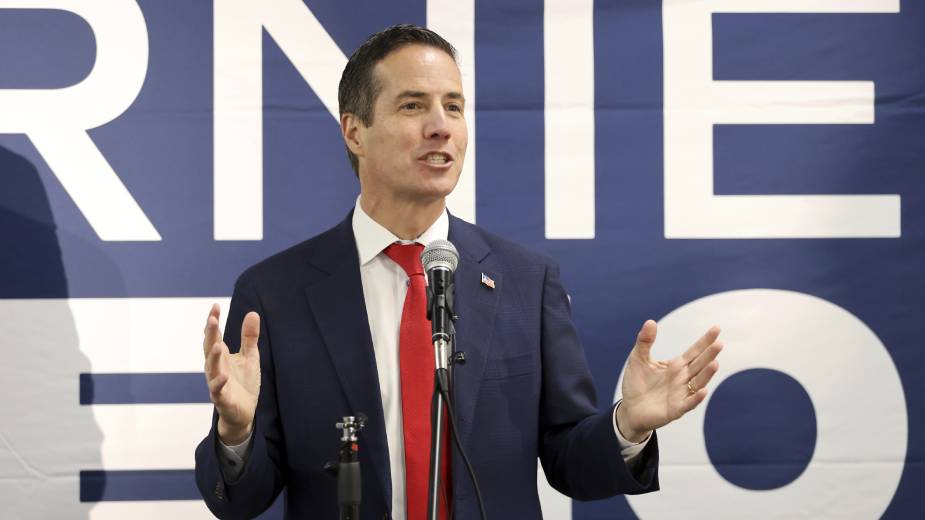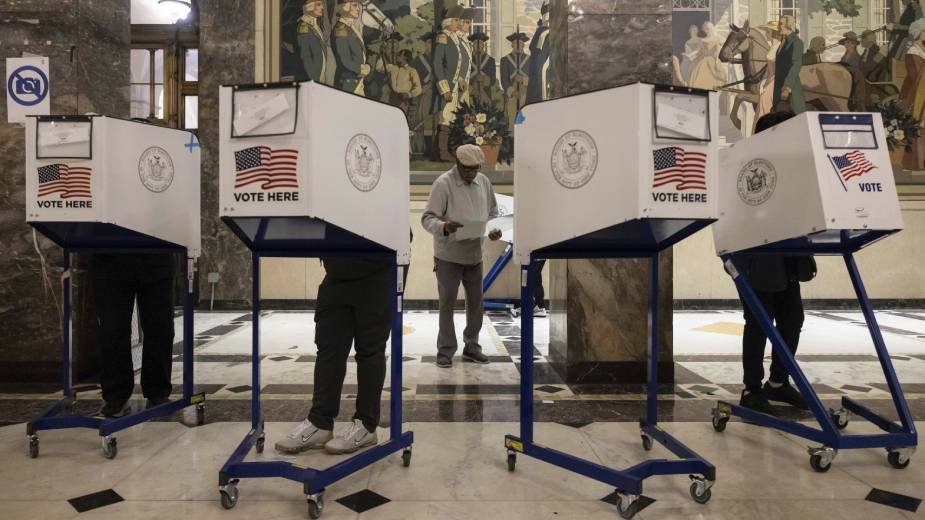New Nafta Doesn’t Go Far Enough, Trumka Warns
YOUNGSTOWN, Ohio – The national president of the AFL-CIO says the newly renegotiated North American Free Trade Agreement, or Nafta, falls short of protecting the interests of workers in the United States and wants to see these concerns addressed before a new agreement is even considered for approval.
“We have a chance to rewrite Nafta,” Richard Trumka told about 25 representatives of labor groups during a roundtable discussion Tuesday morning at the Youngstown Historical Center for Industry and Labor.
The Trump administration has put before Congress a re-tooled Nafta – now called the USMCA, or United States-Mexico-Canada Agreement. The agreement was reached in November but has yet to be ratified.
It contains provisions that the Trump administration says boosts domestic manufacturing for vehicles, calls for an average higher wage to manufacture 45% of a vehicle’s content, provides protection for intellectual property and sets higher environmental standards.
“The major concern we have is the lack of enforcement,” Trumka told reporters after the roundtable. “This agreement, as it’s currently constituted, can’t be enforced.”
He said three aspects of the deal in particular are troubling. First, Trumka said he’s skeptical that Mexico has the resources to raise wages to a level acceptable in the agreement. Currently, low-tier employees in Mexico earn 97-cents an hour, mid-range earners bring home $1.28 an hour and higher hourly wage employees earn $1.78 an hour, he said.
“They use protectionist contracts with employers to keep wages low,” Trumka said.
Plus, he said the agreement lacks a mechanism to resolve issues through arbitration. A third question relates to penalties that could be enforced should one of the trade partners violate the pact, he said.
Trumka’s solution would be to stop products from any violating country from entering the U.S.
Another problem with the new agreement is that it prohibits drug companies from working on generic alternatives for a 10-year period, giving big pharmaceutical corporations an advantage and monopoly in the market, Trumka said.
“This is worse than the old Nafta,” Trumka said, which imposed a six-year window.
Trumka said that the AFL-CIO proposed 130 changes that should be inserted in the agreement.
The labor leader said U.S. Speaker of the House Nancy Peolsi has the power to schedule a vote on the new trade agreement, and in the past she has urged stronger language to force Mexico to change its labor laws.
As for ratifying a new agreement, Trumka said he’s in no hurry.
“It’s more important to get it right than it is to be a slave to an artificial deadline,” he said. “For 25 years, we’ve lived under a bad agreement that was wrong. We could take a extra couple of months or whatever it takes to get it right.”
Trumka kicked off his Nafta National Trade Tour Monday in Pittsburgh. After his meeting in Youngstown, he was to visit Akron and Cleveland before heading to Detroit.
Workers in these cities have largely held agreements such as Nafta partially responsible for the demise of manufacturing presence in the United States, especially in the Mahoning Valley.
Nafta was signed by President Bill Clinton, a Democrat, in 1993 and became effective in 1994. Labor leaders have argued that the trade deal made it easier for companies to ship production across the border into Mexico where they could benefit from low-wage employees and relaxed regulations.
“I don’t think people recognize that we wouldn’t be in the situation we’re in a Lordstown right now if it wasn’t for Nafta,” said David Green, president of USW Local 1112.
In March, the General Motors Lordstown Complex produced its final Chevrolet Cruze at the plant, ending 53 years of vehicle production. Over the last two years, the plant had shed more than 4,500 jobs.
“When I started at General Motors, there were over 300,000 UAW GM workers in the U.S.,” Green said. “Right now, there are just under 48,000.”
At one time, there were 15,000 workers at Delphi and 13,000 at Lordstown, he said.
“This is an issue that will affect you,” he said.
“We need to put people back to work in this country,” declared Gary Steinbeck, a retired division director at the United Steelworkers union. “We can’t survive as a service industry. We need to make product and we’re not making the product.”
He said that message was lost during the last presidential election, especially among the Democratic Party’s candidate, Hillary Clinton.
“This election is going to be about jobs, jobs, jobs,” Steinbeck said.
Trump’s tariff policy might have a short-term impact that could help some sectors of manufacturing, but they’re not a long-term solution, added Jose Arroyo of the Steelworkers Union. “I’ve seen five [USW] plants close down in the last four years,” he said.
Parker Hannifin, Warren Steel Holdings and Sherwin-Williams operations, Arroyo said, moved some production overseas. More recently, Source Providers, which sequenced parts for the Chevrolet Cruze at GM Lordstown, shut its doors when the auto plant was idled.
“I lost 600 members over on Victoria Road that were tied to the supply chain,” Arroyo said, and advocated for an expansion of federal training programs for displaced workers.
Others were frustrated over promises unfulfilled by the parade of presidential candidates that have visited the Valley throughout the years.
“When you talk to these candidates, tell them what you expect,” Trumka said. “I don’t want them talking about some theoretical issue. You want to talk about what you talk about at home.”
In his last visit to the Mahoning Valley, in 2017, President Donald Trump urged residents not to sell their homes because he was “going to get those jobs coming back, and we’re going to fill up those factories or rip them down and build brand new ones,” he said at a rally at the Covelli Centre.
“All of a sudden we get this man promising all these things – you’re going to keep your jobs, good paying jobs, keep your house,” said Janet Bernard, retired IUE-CWA union representative and a recording secretary for the Mahoning Trumbull AFL-CIO. “That’s not what happened.”
Debbie Bindas, regional director of AFSCME Council 8, said the lack of concern among political candidates has left many union members apathetic.
“We’ve lost the ability to support each other,” she said. “We need to re-energize.”
Pictured: AFL-CIO President Richard Trumka met with local labor leaders, including Ohio AFL-CIO President Tim Burga and Mahoning/Trumbull Central Labor Council President Bill Padisak.
Copyright 2024 The Business Journal, Youngstown, Ohio.



